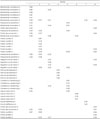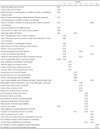1. Chang SJ, Koh SB, Kang MG, Cha BS, Park JK, Hyun SJ, et al. Epidemiology of psychosocial distress in Korean employees. J Prev Med Public Health. 2005; 38:25–37.
2. Charbonneau A, Bruning W, Titus-Howard T, Ellerbeck E, Whittle J, Hall S, et al. The community initiative on depression: report from a multiphase work site depression intervention. J Occup Environ Med. 2005; 47:60–67.

3. Woo JM, Kim W, Hwang TY, Frick KD, Choi BH, Seo YJ, et al. Impact of depression on work productivity and its improvement after outpatient treatment with antidepressants. Value Health. 2011; 14:475–482.

4. Woo JM, Hyun SY, Lee SH, Kang SG, Lee JS, Kim L, et al. Productivity time lost by sleep disturbance among workers in Korea. J Korean Neuropsychiatr Assoc. 2011; 50:62–68.
5. Park YL, Kim W, Chae JH, Oh KS, Frick KD, Woo JM. Impairment of work productivity in panic disorder patients. J Affect Disord. 2014; 157:60–65.

6. Martin A, Fisher CD. Understanding and improving managers' responses to employee depression. Ind Organ Psychol. 2014; 2:270–274.

7. Sohail M, Rehman CA. Stress and health at the workplace-a review of the literature. J Bus Stud Q. 2015; 6:94–121.
8. Griffin ML, Hogan NL, Lambert EG, Tucker-Gail KA, Baker DN. Job involvement, job stress, job satisfaction, and organizational commitment and the burnout of correctional staff. Crim Justice Behav. 2010; 37:239–255.

9. Kashefi M. Job satisfaction and/or job stress: the psychological consequences of working in ‘high performance work organizations’. Curr Sociol. 2009; 57:809–828.
10. Chao MC, Jou RC, Liao CC, Kuo CW. Workplace stress, job satisfaction, job performance, and turnover intention of health care workers in rural Taiwan. Asia Pac J Public Health. 2015; 27:NP1827–NP1836.

11. Govind K, Ratchagar I, Ruby Violet Rani E. Job stress in relation to mental health among the college teachers. Annamalai Int J Bus Stud Res. 2014; 6:35–46.
12. Hu Y, Wang D, Xu G, Xu P. The relationship between work stress and mental health in medical workers in East China. Soc Behav Pers. 2014; 42:237–244.

13. Cdc.gov [homepage on the Internet]. Atlanta: National Institute for Occupational Safety and Health;updated 2014 Jun 6. cited 2015 Aug 29. Available from:
https://www.cdc.gov/niosh/docs/99-101/.
14. Caplan RD, Jones KW. Effects of work load, role ambiguity, and type A personality on anxiety, depression, and heart rate. J Appl Psychol. 1975; 60:713–719.

15. Hsiao HY, Mor Barak ME. Job-related stress, social support, and work–family conflict among Mexican workers in a multinational company: a case study of a Korean-owned, US-branded former “sweatshop” in Mexico. Int J Soc Welf. 2014; 23:309–320.

16. Hagihara A, Miller AS, Tarumi K, Nobutomo K. Social support has both positive and negative effects on the relationship of work stress and alcohol consumption. Stress Health. 2003; 19:205–215.

17. LeCompete MD. Analyzing qualitative data. Theory Pract. 2000; 39:146–154.

18. Choi SM, Kang TY, Woo JM. Development and validation of a modified form of the Stress Response Inventory for workers. J Korean Neuropsychiatr Assoc. 2006; 45:541–553.
19. Diener E, Emmons RA, Larsen RJ, Griffin S. The satisfaction with life scale. J Pers Assess. 1985; 49:71–75.

20. Choi YH, Lee HK, Lee DG. Validation of the Korean version of Snyder’s Dispositional Hope Scale. Korean J Soc Pers Psychol. 2008; 22:1–16.
21. Scheier MF, Carver CS, Bridges MW. Distinguishing optimism from neuroticism (and trait anxiety, self-mastery, and self-esteem): a reevaluation of the Life Orientation Test. J Pers Soc Psychol. 1994; 67:1063–1078.

22. Kim SH. Psychological characterristics of realistic and unrealistic optimists [dissertation]. Seoul: The Catholic University of Korea;2003.
23. Lyubomirsky S, Lepper HS. A measure of subjective happiness: preliminary reliability and construct validation. Soc Indic Res. 1999; 46:137–155.
24. Trenberth L, Dewe P. The importance of leisure as a means of coping with work related stress: an exploratory study. Couns Psychol Quart. 2002; 15:159–172.







 PDF
PDF ePub
ePub Citation
Citation Print
Print








 XML Download
XML Download